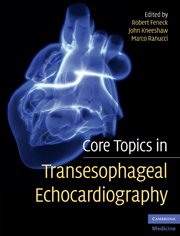Book contents
- Core Topics in Transesophageal Echocardiography
- Core Topics in Transesophageal Echocardiography
- Copyright page
- Contents
- Contributors
- Preface
- Addendum to Chapter 1: updated indications for perioperative TEE
- Section 1 Fundamentals of transesophageal echocardiography
- Section 2 Practical issues in transesophageal echocardiography
- 14 Ischemic heart disease
- 15 Cardiomyopathies
- 16 Mitral valve repair
- 17 Aortic valve surgery
- 18 Infective endocarditis
- 19 Prosthetic valves
- 20 Adult congenital heart disease
- 21 Critical and emergency care
- 22 Three-dimensional imaging
- 23 Recentdevelopments in Doppler imaging
- 24 Transesophageal echocardiography reporting
- Index
15 - Cardiomyopathies
from Section 2 - Practical issues in transesophageal echocardiography
Published online by Cambridge University Press: 10 May 2010
- Core Topics in Transesophageal Echocardiography
- Core Topics in Transesophageal Echocardiography
- Copyright page
- Contents
- Contributors
- Preface
- Addendum to Chapter 1: updated indications for perioperative TEE
- Section 1 Fundamentals of transesophageal echocardiography
- Section 2 Practical issues in transesophageal echocardiography
- 14 Ischemic heart disease
- 15 Cardiomyopathies
- 16 Mitral valve repair
- 17 Aortic valve surgery
- 18 Infective endocarditis
- 19 Prosthetic valves
- 20 Adult congenital heart disease
- 21 Critical and emergency care
- 22 Three-dimensional imaging
- 23 Recentdevelopments in Doppler imaging
- 24 Transesophageal echocardiography reporting
- Index
Summary
Keywords
- Type
- Chapter
- Information
- Core Topics in Transesophageal Echocardiography , pp. 247 - 267Publisher: Cambridge University PressPrint publication year: 2010

